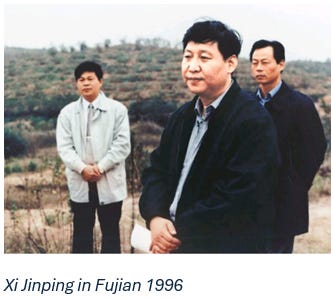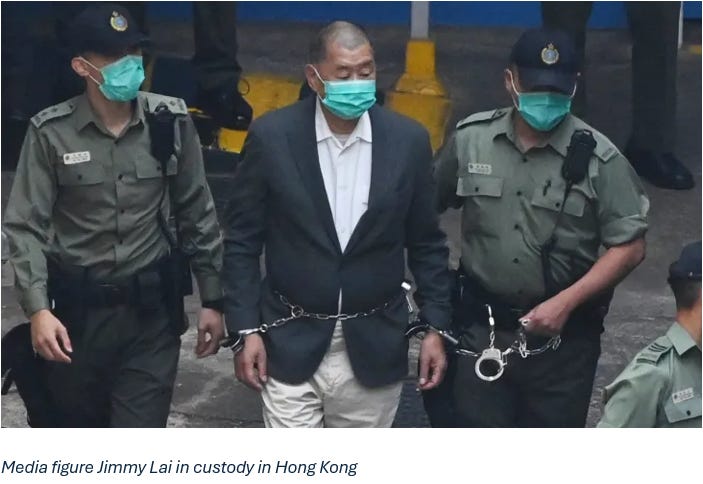Xi – Father & Son
Xi Zhongxun demonstrated what it meant to be a great leader, why has Xi Jinping fallen so far from the tree?
Xi Zhongxun was a hero of the Chinese Communist era, he showed promise as a leader at a young age joining the community party before he was twenty years old, making impressive contributions during the early days of the CCP.
Leadership of the Shaanxi-Gansu Border Region Soviet (1930s-1940s)
Throughout his twenties, Xi played a critical role in establishing and leading this Communist base, which became a strategic stronghold during the Chinese Civil War. His efforts included organizing guerrilla warfare, implementing land reforms, and providing security for Yan’an while Mao used the region as the Communist Party’s base.
Coordination of the Northwest Field Army (1947-1949)
Xi was instrumental in military campaigns alongside Peng Dehuai, aiding the Communist forces' victories in the northwest. His strategic planning and ability to mobilize resources contributed significantly to the eventual Communist takeover of the region.
Integration of Ethnic Minorities
Xi Zhongxun cultivated alliances with influential Hui Muslim leaders and communities in the region, who were critical to maintaining stability and logistical support. He emphasized mutual respect for religious practices and worked to address their grievances, such as ensuring fair treatment and protecting their economic interests. By advocating policies that respected Islamic customs, Xi earned trust, which facilitated cooperation with Hui militias and strengthened the Red Army's position in the region.
Mutual Respect with Tibet
Xi Zhongxun’s personal relationship with the Dalai Lama was exemplified by his respectful approach during the 1950s, when he helped facilitate the Dalai Lama’s visit to Beijing in 1954-1955. Xi, along with other senior leaders, ensured the Dalai Lama felt valued by engaging him in discussions about Tibet's future and fostering cultural exchanges that underscored mutual respect. This visit strengthened the Dalai Lama’s confidence in the possibility of peaceful coexistence under the framework of the 17-Point Agreement.
Open Door for Hong Kong and Taiwan
Xi Zhongxun was highly welcoming toward investors from Hong Kong and Taiwan during his tenure in Guangdong in the 1980s. Recognizing their importance in driving economic reform and modernization, he encouraged cross-border investments and fostered policies that built trust and cooperation.
Xi Jinping
During his career, Xi Jinping has shown little of his father’s diplomacy or statesmanship.
Xinjiang
Xi Jinping’s policy of establishing and expanding "re-education" camps in Xinjiang, officially termed vocational education and training centers, coupled with a broader campaign of surveillance, repression, and forced assimilation, have had widespread consequences:
Mass Internment: Reports indicate that over a million Uyghurs, Kazakhs, and other Muslim minorities have been detained without due process. Many are subjected to political indoctrination, forced renunciations of their religious beliefs, and alleged psychological and physical abuse.
Erosion of Culture and Religion: Policies aimed at eradicating Uyghur cultural and religious practices include the destruction of mosques, bans on traditional clothing and religious observances, and restrictions on the Uyghur language in schools.
Forced Labor: Detainees and other residents have reportedly been compelled to work in factories under coercive conditions, contributing to global supply chains while being denied basic rights.
High-Tech Surveillance: The region has become a testing ground for advanced surveillance technology, including facial recognition, DNA collection, and AI-driven social control systems, leading to pervasive monitoring of daily life.
Family Separation: Children of detained individuals have been placed in state-run orphanages or boarding schools, where they are reportedly taught to abandon their cultural identity.
Population Control: Evidence of forced sterilizations and other measures to reduce Uyghur birth rates has led some experts to classify these actions as genocidal under international law.
These policies have drawn widespread international condemnation for their human rights abuses and long-term impact on the Uyghur people and other minorities in Xinjiang.
Hong Kong
Since 2012, Xi Jinping has implemented increasingly restrictive policies toward Hong Kong, significantly eroding its autonomy under the “one country, two systems” framework. Key measures include:
National Security Law (2020): This law criminalized acts of secession, subversion, terrorism, and collusion with foreign forces, leading to the suppression of political dissent and freedom of expression. It enabled Beijing to bypass Hong Kong's legislative processes and established broad authority for Chinese security agencies in the city.
Crackdown on Pro-Democracy Movements: Authorities arrested and prosecuted activists, journalists, and opposition politicians under the National Security Law and other legal pretexts, effectively dismantling the pro-democracy movement.
Electoral Overhaul (2021): Changes to Hong Kong's electoral system drastically reduced democratic representation, ensuring that only “patriots” loyal to Beijing could hold public office.
Censorship and Media Suppression: Independent media outlets, such as Apple Daily, were forced to shut down, and press freedom has significantly declined.
Education and Ideological Control: The introduction of “patriotic education” in schools sought to instill loyalty to Beijing while suppressing narratives critical of the CCP.
Judicial Independence Undermined: Beijing increased pressure on Hong Kong’s judiciary, raising concerns about the erosion of legal protections and impartiality.
These policies have transformed Hong Kong from a semi-autonomous region with vibrant civil liberties to one under tight authoritarian control, drawing widespread international condemnation.
Taiwan
Xi Jinping has employed a mix of military, diplomatic, economic, and psychological strategies to pressure Taiwan to capitulate to CCP rule:
Military Escalation: Increased People’s Liberation Army (PLA) activities, including frequent air and naval incursions into Taiwan’s air defense identification zone (ADIZ), large-scale military exercises, and simulations of blockades or invasions near Taiwan. Development of advanced missile systems and amphibious capabilities to threaten Taiwan directly.
Diplomatic Isolation: Pressuring countries and international organizations to deny Taiwan recognition or participation. Coercing nations to sever official ties with Taiwan and adhere to Beijing’s “One China” policy.
Economic Leverage: Restricting trade and tourism from mainland China to Taiwan as punitive measures. Offering economic incentives to Taiwanese businesses in mainland China to foster dependency.
Disinformation and Influence Campaigns: Deploying social media and state-run propaganda to spread pro-Beijing narratives and sow divisions within Taiwan’s society and political system. Supporting pro-unification groups and politicians in Taiwan.
Political Speeches and Proposals: Reiterating that Taiwan’s unification with China is a core CCP objective, refusing to renounce the use of force. Advocating for the “one country, two systems” framework, despite its rejection in Taiwan due to Hong Kong's experience.
Economic and Military Threats to Allies: Pressuring Taiwan’s allies, like the U.S. and Japan, to reduce support for Taiwan through economic or geopolitical measures.
These actions have heightened tensions across the Taiwan Strait and increased international concern over the potential for conflict.
One and the Same Family
In his 2025 New Year address, Xi Jinping said, “We Chinese on both sides of the Taiwan Strait belong to one and the same family.” Xi’s words ring hollow considering his failure to measure up to the example set within his own family. Xi Jinping has defied his father’s example on Xinjiang, Hong Kong, and now Taiwan. There are many more instances where Xi Jinping simply hasn’t measured up. It’s time for the West to recognize this undeniable fact and start standing up to the impostor leader.












My own opinion is: Xi Jinping is desperately trying to redeem his father and thus his family as his father was party purged, no?